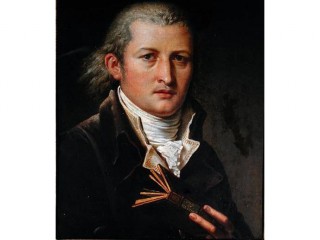
Edward Jenner biography
Date of birth : 1794-05-17
Date of death : 1823-01-26
Birthplace : Berkeley, Gloucestershire, England
Nationality : English
Category : Science and Technology
Last modified : 2011-03-16
Credited as : Physician, introduced vaccination against smallpox ,
The English physician Edward Jenner introduced vaccination against smallpox and thus laid the foundation of modern concepts of immunology.
Edward Jenner was born on May 17, 1749, in the village of Berkeley in Gloucestershire. At 8 his schooling began at Wooton-under-Edge and was continued in Cirencester. At 13 he was apprenticed to Daniel Ludlow, a surgeon, in Sodbury. In 1770 Jenner went to London to study with the renowned surgeon, anatomist, and naturalist John Hunter, returning to his native Berkeley in 1773.
Jenner had been interested in nature as a child, and this interest expanded under Hunter's guidance. For example, in 1771 the young physician arranged the zoological specimens gathered during Capt. James Cook's voyage of discovery to the Pacific. His thorough work led to his being recommended for the position of naturalist on the second Cook voyage, but he declined in favor of a medical career. Jenner aided in Hunter's zoological studies in many ways during his few years in London and then from Berkeley. Hunter's experimental methods, insistence on exact observation, and general encouragement are reflected in this work in natural history but are especially apparent in Jenner's introduction of vaccination.
In Eastern countries the practice of inoculation against smallpox with matter taken from a smallpox pustule was common. This practice was introduced into England in the early 18th century. Although such inoculation aided in the prevention of the dreaded and widespread disease, it was dangerous. There was a common story among farmers that if a person contracted a relatively mild and harmless disease of cattle called cowpox, immunity to smallpox would result. Jenner first heard this story while apprenticed to Ludlow, and when he went to London he discussed the possibilities of such immunity at length with Hunter. Hunter encouraged him to make further observations and experiments, and when Jenner returned to Berkeley he continued his observations for many years until he was fully convinced that cowpox did, in fact, confer immunity to smallpox. On May 14, 1796, he vaccinated a young boy with cowpox material taken from a pustule on the hand of a dairymaid who had contracted the disease from a cow. The boy suffered the usual mild symptoms of cowpox and quickly recovered. A few weeks later the boy was inoculated with smallpox matter and suffered no ill effects.
In June 1798 Jenner published An Inquiry into the Causes and Effects of the Variolae Vaccinae, a Disease Discovered in Some of the Western Counties of England, Particularly in Gloucestershire, and Known by the Name of the Cowpox. In 1799 Further Observations on the Variolae Vaccinae or Cowpox appeared and, in 1800, A Continuation of Facts and Observations Relative to the Variolae Vaccinae, or Cowpox. The reception of Jenner's ideas was a little slow, but official recognition came from the British government in 1800. For the rest of his life Jenner worked consistently for the establishment of vaccination. These years were marred only by the death in 1815 of his wife, Catherine Kingscote Jenner, whom he had married in 1788. Jenner died of a cerebral hemorrhage in Berkeley on Jan. 26, 1823.
















